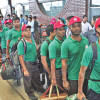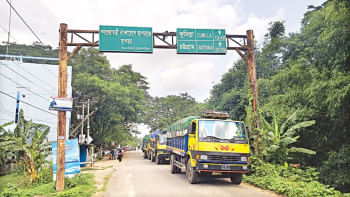Pursuit of dream ends in tragedy
Europe has long been a promised land for Bangladeshi fortune seekers. With illusion further fuelled by human traffickers, many take risky journeys through the c, knowing well it may turn fatal in the hazardous sea.
But when they are held hostage by human traffickers or other criminal gangs in Libya, a transit point en route to Europe, they realise that heading for the continent illegally was the gravest mistake of their life.
It’s late by then as they already got caught in the clutches of torture and debt.
Alamin Miah, 25, of Agailjhara in Barishal, who survived the migrant boat capsize off Tunisian coast on Friday, could be the perfect case in point.
Convinced by a manpower broker, he took the risk of leaving for Libya sometime in May last year. The contract with the broker was for a trip to the North African country from where he on his own would try to reach Italy.
Alamin, then a private university student, says he found it difficult to get a job or do business in Bangladesh. So, he decided to go to Italy and build a career.
“I had no idea that things were so different in Libya,” Alamin told The Daily Star by phone from a Tunisian Red Crescent camp Monday night.
He is one of the 16 survivors, including 14 Bangladeshis, of the tragedy that claimed lives of some 65 migrants including around 40 Bangladeshis.
Alamin said mafias held him and dozens
of others hostage in camps of Libya. He faced various forms of physical and mental tortures for ransom.
In several phases, his family had to pay around Tk 11 lakh before he was put on an Italy-bound ship last Thursday night. In mid-sea, he along with others was shifted to a small boat.
“Bangladesh embassy officials are asking me if I would return home. But tell me how can I return home now? My parents are heavily in debt,” he said.
ASM Ashraful Islam, labour counsellor of Bangladesh Embassy in Libya, last week said they relocated some 300 Bangladeshis to safe places from the risky suburbs of Tripoli as violence escalated in the Libyan capital and its surroundings early April.
The embassy announced arrangements of voluntary repatriation but only 50 of them accepted the offer.
“Others said they don’t want to return home because they spent huge sums to reach there,” he told The Daily Star.
Though in debt, Alamin and other survivors can still consider themselves lucky as they escaped death in what has become one of the world’s most dangerous seas for migrants.
Abdul Aziz, 25, and his cousins Ahmed Hossain, 24, and Liton Miah, 24, of Fenchuganj in Sylhet are among those who drowned in the Mediterranean on Friday.
Aziz was confused about his future after dropping out of undergraduate studies early last year, said his elder brother Mofizur Rahman.
That was when he came in contact with a travel agent -- Enamul Haque of New Yeahia Overseas -- who promised the three cousins and their uncle Belal Ahmed a safe passage to Italy.
Enamul, a distant relative who also comes from Fenchuganj, said the four would be sent to Italy on a ship straight from India, Mofiz told The Daily Star at his residence on Monday.
Aziz was stubborn though his another elder brother, who stays in Spain, advised him not to take the risk.
Finally, under a contract of Tk 8 lakh each, they left home for Italy on December 7 last year. They were first taken to India and Sri Lanka before being flown to Libya.
“In Libya, they lived a life like that in a prison. The camp was hell for them. They spent days without water and food. Eighty-six people lived in a single room. They had only one toilet,” said Mofiz.
“We sent some money to Libya for them to buy food, but they seldom got it. Often they had to starve.”
As Aziz managed to share the situation with his family over phone, Mofiz requested the travel agent to send them all back but in vain.
On Friday night, after hearing the news of the tragedy in Tunisia, he called Enamul, who said his relatives were not in that ship.
On Saturday, uncle Belal, who survived in the sea, called Mofiz in Sylhet to inform him of the tragic death of the three cousins.
“Uncle said that in the middle of the sea they were forced at gunpoint to board a boat from the big ship. Within five minutes, the rubber boat sank.
“They had no life jackets.”
Travel agent Enamul by now locked his office in Sylhet city. He has been absconding since Saturday with his mobile phones switched off.
According to Shakirul Islam, executive director of Ovibashi Karmi Unnayan Programme (OKUP), which conducted a research on the migrants who reached Italy via Libya, said Bangladesh had stopped sending workers to the North African country in 2014.
Yet thousands of Bangladeshis were lured to go to Libya over the following years with the promise of a safe journey to Europe.
Libya has become a major route for human smuggling to Europe amid lawlessness in the country.
Transnational gangs operate in war-torn or poverty-stricken African and Middle Eastern countries like Sudan, Egypt, Eretria, Chad, Syria and Iraq to smuggle the nationals of those countries to Europe.
They also target unemployed Bangladeshi youths who have fantasy about Europe.
According to Zaid Bakht, former research director of Bangladesh Institute of Development Studies, some two million youths join the labour force in Bangladesh every year.
But only about 60 percent of them are absorbed into domestic and foreign labour markets. The rest remain either unemployed or underemployed and often become desperate to find jobs abroad.
Shakirul Islam said human smugglers use a variety of techniques. They manage tourist visas of the United Arab Emirates or Turkey or work visas of Sudan or Egypt and then take the jobseekers to Libya either by land or air.
“Our research found some Bangladeshis were fist taken to Sudan and then to Libya through the desert,” he said.
After families pay big amounts of ransom, the migrants are put in the ships for Europe. Those being lucky reach their dream destination and others drown.
Many of the Bangladeshis, who had remained in Libya even after the 2011 war, also opted to take the voyage to Europe, finding it difficult to work in the North African country, Shakirul told The Daily Star.
From January to May 22 in 2017, 5,650 Bangladeshis arrived in Italy, accounting for 11 percent of all arrivals of undocumented migrants in the country, according to the Italian Ministry of the Interior.
In 2016, the number was 7,578, says the Médecins Sans Frontières (MSF).
According to the European Union, nearly one lakh undocumented Bangladeshis live in the EU, which has now tightened immigration policies. In 2017, it funded a project for return of the undocumented Bangladeshi migrants.
While the number of migrants arriving in Europe can be known, it’s totally unknown how many died in the Mediterranean, said Ashraful Islam of Bangladesh Embassy in Libya.
In a major boat accident in the sea, 24 Bangladeshis died in August 2015.
“It’s high time we took some serious actions to stop such illegal migration,” he told The Daily Star.


 For all latest news, follow The Daily Star's Google News channel.
For all latest news, follow The Daily Star's Google News channel. 






Comments